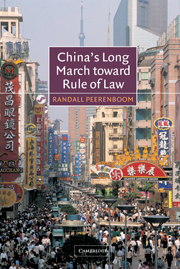Book contents
- Frontmatter
- Contents
- Preface
- List of abbreviations
- 1 Introduction
- 2 The evolution of rule of law in China: the role of law in historical context
- 3 Post-Mao reforms: competing conceptions of rule of law
- 4 Rule of law and its critics
- 5 Retreat of the Party and the state
- 6 The legislative system: battling chaos
- 7 The judiciary: in search of independence, authority, and competence
- 8 The legal profession: the quest for independence and professionalism
- 9 The administrative law regime: reining in an unruly bureaucracy
- 10 Rule of law and economic development
- 11 Rule of law, democracy, and human rights
- 12 Conclusion: the future of legal reform
- References
- Index
9 - The administrative law regime: reining in an unruly bureaucracy
Published online by Cambridge University Press: 20 July 2009
- Frontmatter
- Contents
- Preface
- List of abbreviations
- 1 Introduction
- 2 The evolution of rule of law in China: the role of law in historical context
- 3 Post-Mao reforms: competing conceptions of rule of law
- 4 Rule of law and its critics
- 5 Retreat of the Party and the state
- 6 The legislative system: battling chaos
- 7 The judiciary: in search of independence, authority, and competence
- 8 The legal profession: the quest for independence and professionalism
- 9 The administrative law regime: reining in an unruly bureaucracy
- 10 Rule of law and economic development
- 11 Rule of law, democracy, and human rights
- 12 Conclusion: the future of legal reform
- References
- Index
Summary
Because the essence of rule of law is the ability of law to impose meaning-ful limits on the state and individual members of the ruling elite, an effective administrative law regime that limits the arbitrary acts of government is essential to rule of law. Yet despite broad agreement as to the importance of administrative law, administrative law is one area where there is tremendous variation among legal systems around the world. Simply put, there is no single correct way to deal with common administrative problems, a fact often overlooked by China's critics. Thus, while all states rely on generally applicable laws to one degree or another to provide predictability and certainty, and attempt to limit abuses of discretion, they may differ with respect to how much administrative discretion is desirable. East Asian development states tend to favor a larger, more flexible role for the executive in managing the economy than Western liberal states. Administrative officials in China also enjoy considerable discretion, in part because the rapidly changing economic environment requires flexibility.
In light of the diversity among administrative law regimes, the lack of a single blueprint for success, and a distinctive set of institutional, cultural, economic, and political constraints, the development of China's administrative law regime inevitably will be determined primarily by its own contingent, context-specific conditions, including which version of rule of law prevails.
- Type
- Chapter
- Information
- China's Long March toward Rule of Law , pp. 394 - 449Publisher: Cambridge University PressPrint publication year: 2002
- 1
- Cited by



